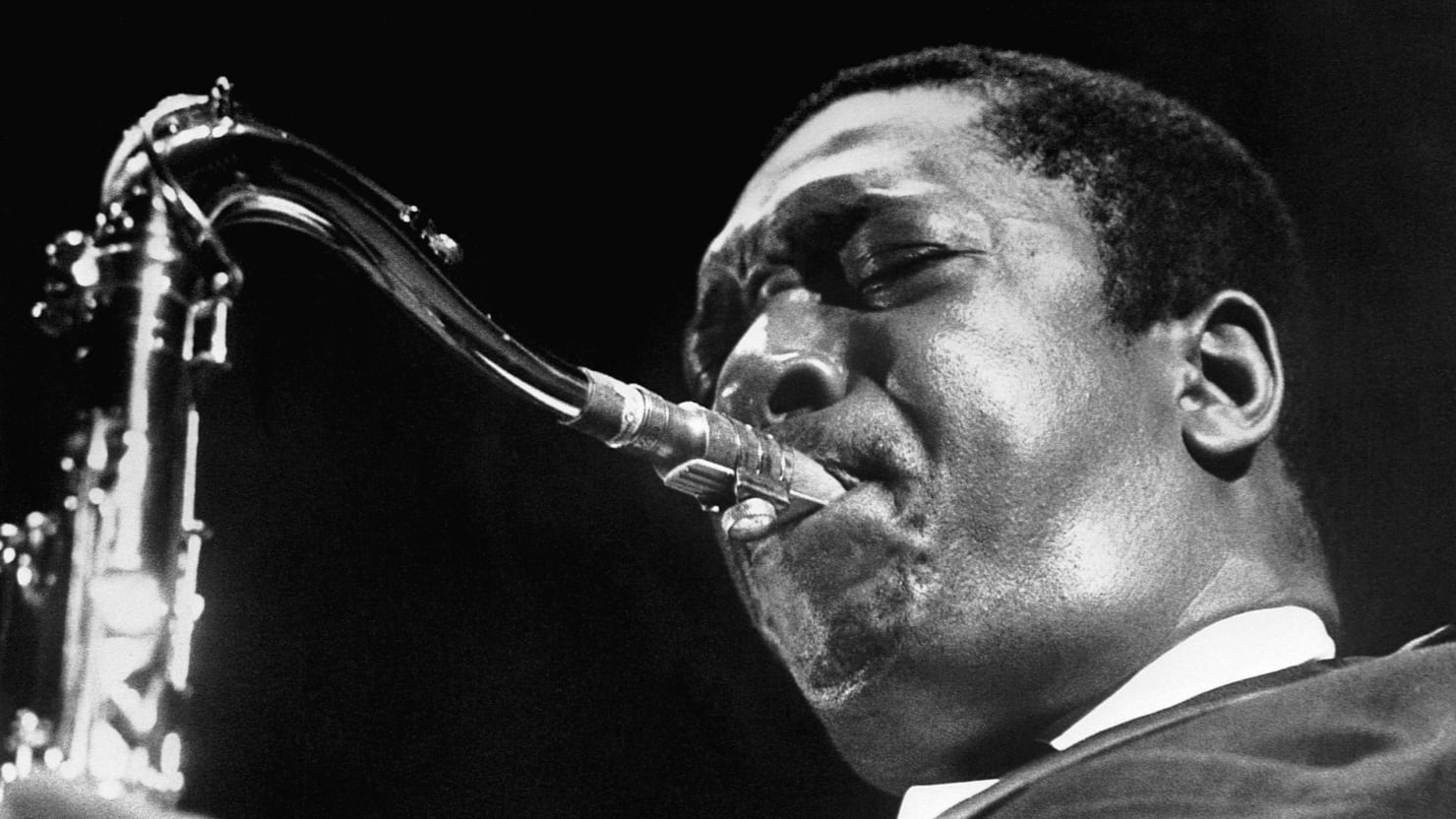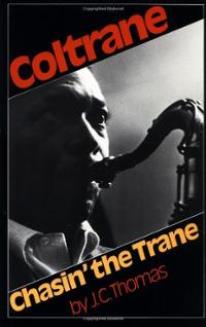fdrennen
Organist in Residence
On July 17th , 1967 ‘Trane died of liver cancer at age 40.Had he lived he would have been 89.
John Coltrane: cultural saint of the black power/ Black Consciousness/ Black Arts movement as well as an actual Saint of the African Orthodox Church, which owes its Episcopate and Apostolic Authority to the Syrian Church of Antioch where the disciples were first called Christians, and of which St. Peter the Apostle was the first Bishop. The Saint John Coltrane African Orthodox Church’s website says:
“Further investigation into this man proved him to be not just a jazz musician but one who was chosen to guide souls back to God”
The African Orthodox Church was founded in response to racism in the Episcopal Church USA.
Coltrane was born and raised in a "Zion Methodist" household, and was influenced by African-American religion and spirituality since birth. His maternal grandfather, the Reverend William Blair, was a preacher at an African Methodist Episcopal Zion Church in High Point, North Carolina, and John’s paternal grandfather, Reverend William H. Coltrane, was an A.M.E. Zion minister in Hamlet, North Carolina. John’s parents met through church affiliation, and married in 1925. John was born September 23, 1926. As a youth, John practiced music in the southern African-American church. In A Night in Tunisia: Imaginings of Africa in Jazz, Norman Weinstein notes the parallel between Coltrane’s music and his experience in the southern church.
AME Zion Church: 1796 New York City by African-American worshipers from John street Methodist Episcopal Church. Sojourner Truth, and Harriet Ross Tubman, Frederick Douglass were Zion Methodists ("Zion Methodist" The Book of Discipline of the AME Zion Church, 2008: 47.) and are listed on the Episcopal Church USA calendar of Saints. Other notable Zion Methodists include Paul Robeson and Coretta Scott King.
John Coltrane's unique voice summons ecstasy not only because of the number of notes he plays, the types of scales he employs or tone. It's the oracle the spiritually in tune received.
“ If it only becomes a technical thing to get around your horn and execute what you’ve practiced, you’re not executing your feelings.” Joe Lovano
Dr. Cuthbert Ormond Simpkins’s 1975 book, Coltrane: A Biography describes Coltrane’s family background with emphasis on his maternal grandfather, Reverend William Wilson Blair, an A.M.E. Zion minister and relentless, trailblazing leader for equal rights:
(Rev. Blair) denounced the white man from the pulpit, teaching that we should work together for our common advancement. Some Blacks thought being so straightforward with important white folks was improper, and that conditions for Blacks need not be improved. Others shuddered as he unleashed attacks with all the fury of the holy ghost.
“After being fired from the Miles Davis quintet in 1957 for His drug and alcohol abuse underwent a spiritual awakening, and received from God a body of spiritual music. "As Coltrane's relationship with God strengthened, he had dreams in which God revealed various ideas and musical works to him. Eventually, in the winter of 1964, Coltrane said that God revealed the entire work of "A Love Supreme" to him, just as He had revealed the various texts of the Bible to his believers. Coltrane was now ordained as a minister and he received the command to go out and preach God's word as a mature musician both musically and spiritually committed to God. From this point on until Coltrane's death in 1967, he claimed that 90 percent of his playing was prayer." (http://www-mcnair.berkeley.edu/95journal/EmmetPrice.html)
By the late 1960s as the post-bebop era emerged, John Coltrane had gained status as the cultural saint of the Black Arts movement. A strong supporter of the civil rights movement, Coltrane's song Alabama, written in response to the 1963 Birmingham church bombing that killed four little girls, symbolized the fusing of his musical, political and cultural consciousness and stood as a model for the emerging black power/ black consciousness movement of the period. Compositions such as Africa, Liberia, Dahomey Dance, Bakai, Dakar, and Afro Blue celebrated a new black aesthetic and freedom that expressly linked African America with Africa, thus celebrating the pan-Africanist transnational imagination. Coltrane was revered by a younger generation of revolutionary poets and writers who found comfort and inspiration in his music.
See more at: http://www.blackpast.org/a…/coltrane-john-william-1926-1968…
Some of the strongest yet most mysterious sounds of discontent were coming from the avant-garde jazz community, with artists such as Charles Mingus Jr., Max Roach, and Archie Shepp and free-thinking experimenters such as Ornette Coleman, Cecil Taylor, and John Coltrane musing upon
ideas of what radical change is all about. PARTY MUSIC, Copyright © 2013 by Rickey Vincent
Coltrane connected African tonal languages and the inflections of Martin Luther King Jr.'s rhythmic voice and God-given message to its African roots via largely extra-verbal sprechgesang.
Richard Lischer describes the way Martin Luther King Jr.'s voice moved through a sermon: The gradual ascendancy of his pitch from a low growl at the beginning of the sermon to a piercing shout at the upper range of his high baritone, the predictable rhythm of the rise and fall of his voice, and the relentless increase in the rate of his speech all contribute to the melodiousness, the Song like quality, of his voice.? Richard Lischer, The Preacher King: Martin Luther King Jr. and the Word That Moved America (New York: Oxford University Press, 1995) Sounds like a discription of Coltranes playing.
 ▶ 4:32
▶ 4:32
https://www.facebook.com/fdrennensaints/
John Coltrane: cultural saint of the black power/ Black Consciousness/ Black Arts movement as well as an actual Saint of the African Orthodox Church, which owes its Episcopate and Apostolic Authority to the Syrian Church of Antioch where the disciples were first called Christians, and of which St. Peter the Apostle was the first Bishop. The Saint John Coltrane African Orthodox Church’s website says:
“Further investigation into this man proved him to be not just a jazz musician but one who was chosen to guide souls back to God”
The African Orthodox Church was founded in response to racism in the Episcopal Church USA.
Coltrane was born and raised in a "Zion Methodist" household, and was influenced by African-American religion and spirituality since birth. His maternal grandfather, the Reverend William Blair, was a preacher at an African Methodist Episcopal Zion Church in High Point, North Carolina, and John’s paternal grandfather, Reverend William H. Coltrane, was an A.M.E. Zion minister in Hamlet, North Carolina. John’s parents met through church affiliation, and married in 1925. John was born September 23, 1926. As a youth, John practiced music in the southern African-American church. In A Night in Tunisia: Imaginings of Africa in Jazz, Norman Weinstein notes the parallel between Coltrane’s music and his experience in the southern church.
AME Zion Church: 1796 New York City by African-American worshipers from John street Methodist Episcopal Church. Sojourner Truth, and Harriet Ross Tubman, Frederick Douglass were Zion Methodists ("Zion Methodist" The Book of Discipline of the AME Zion Church, 2008: 47.) and are listed on the Episcopal Church USA calendar of Saints. Other notable Zion Methodists include Paul Robeson and Coretta Scott King.
John Coltrane's unique voice summons ecstasy not only because of the number of notes he plays, the types of scales he employs or tone. It's the oracle the spiritually in tune received.
“ If it only becomes a technical thing to get around your horn and execute what you’ve practiced, you’re not executing your feelings.” Joe Lovano
Dr. Cuthbert Ormond Simpkins’s 1975 book, Coltrane: A Biography describes Coltrane’s family background with emphasis on his maternal grandfather, Reverend William Wilson Blair, an A.M.E. Zion minister and relentless, trailblazing leader for equal rights:
(Rev. Blair) denounced the white man from the pulpit, teaching that we should work together for our common advancement. Some Blacks thought being so straightforward with important white folks was improper, and that conditions for Blacks need not be improved. Others shuddered as he unleashed attacks with all the fury of the holy ghost.
“After being fired from the Miles Davis quintet in 1957 for His drug and alcohol abuse underwent a spiritual awakening, and received from God a body of spiritual music. "As Coltrane's relationship with God strengthened, he had dreams in which God revealed various ideas and musical works to him. Eventually, in the winter of 1964, Coltrane said that God revealed the entire work of "A Love Supreme" to him, just as He had revealed the various texts of the Bible to his believers. Coltrane was now ordained as a minister and he received the command to go out and preach God's word as a mature musician both musically and spiritually committed to God. From this point on until Coltrane's death in 1967, he claimed that 90 percent of his playing was prayer." (http://www-mcnair.berkeley.edu/95journal/EmmetPrice.html)
By the late 1960s as the post-bebop era emerged, John Coltrane had gained status as the cultural saint of the Black Arts movement. A strong supporter of the civil rights movement, Coltrane's song Alabama, written in response to the 1963 Birmingham church bombing that killed four little girls, symbolized the fusing of his musical, political and cultural consciousness and stood as a model for the emerging black power/ black consciousness movement of the period. Compositions such as Africa, Liberia, Dahomey Dance, Bakai, Dakar, and Afro Blue celebrated a new black aesthetic and freedom that expressly linked African America with Africa, thus celebrating the pan-Africanist transnational imagination. Coltrane was revered by a younger generation of revolutionary poets and writers who found comfort and inspiration in his music.
See more at: http://www.blackpast.org/a…/coltrane-john-william-1926-1968…
Some of the strongest yet most mysterious sounds of discontent were coming from the avant-garde jazz community, with artists such as Charles Mingus Jr., Max Roach, and Archie Shepp and free-thinking experimenters such as Ornette Coleman, Cecil Taylor, and John Coltrane musing upon
ideas of what radical change is all about. PARTY MUSIC, Copyright © 2013 by Rickey Vincent
Coltrane connected African tonal languages and the inflections of Martin Luther King Jr.'s rhythmic voice and God-given message to its African roots via largely extra-verbal sprechgesang.
Richard Lischer describes the way Martin Luther King Jr.'s voice moved through a sermon: The gradual ascendancy of his pitch from a low growl at the beginning of the sermon to a piercing shout at the upper range of his high baritone, the predictable rhythm of the rise and fall of his voice, and the relentless increase in the rate of his speech all contribute to the melodiousness, the Song like quality, of his voice.? Richard Lischer, The Preacher King: Martin Luther King Jr. and the Word That Moved America (New York: Oxford University Press, 1995) Sounds like a discription of Coltranes playing.

https://www.facebook.com/fdrennensaints/
Last edited:





:format(jpeg):mode_rgb():quality(90)/discogs-images/R-645553-1450383192-1156.jpeg.jpg)
:format(jpeg):mode_rgb():quality(90)/discogs-images/R-872532-1295538743.jpeg.jpg)